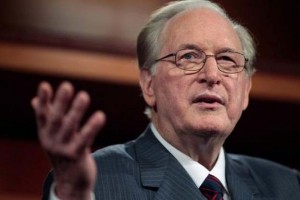Korean carmakers Hyundai and Kia seem to have survived the court of public opinion, sales holding up well despite the flap over false fuel economy claims – but their troubles are far from over, with a Senate committee threatening to call company officials to testify.
Sen. John D. Rockefeller IV, chairman of the Senate Commerce Committee, is asking for more information about how Hyundai and Kia intend to satisfy consumers who purchased vehicles from the two South Korean companies impacted by the fuel economy ratings scandal.
In a letter to John Krafcik, the president and chief executive of Hyundai Motors America, Rockefeller asked for detailed answers to questions about the company’s “Miles Per Gallon” window sticker claims which were proved to be false after an audit by the Environmental Protection Agency. The letter contained a warning that Hyundai and Kia could face Congressional hearings, something which every carmaker dreads.
“I will monitor the results of the EPA’s ongoing investigation to better understand how this error occurred, how Hyundai and Kia may have used inflated fuel economy numbers to attract consumers, and how federal enforcement agencies can better deter similar violations in the future,” Rockefeller said in his letter to Krafcik.
Both Hyundai and Kia officials declined to comment on the content of Rockefeller’s letter. Senator Rockefeller also questioned whether the company’s rebate program would adequately compensate consumers, and called upon Hyundai to answer questions by December 14th.
Following news of the inflated mileage claims, both Hyundai and Kia announced plans to reimburse owners of the 13 affected vehicles for additional fuel costs – plus a bonus of 15%.
Last week, Krafcik said Hyundai’s first priority right now is taking care of existing customers. “It’s certainly a challenge for us,” he said during the LA Auto Show’s press preview.
While some analysts had expected a consumer backlash, the fuel economy flap did not hurt the Korean automakers during November, sales for both makers increasingly significantly, year-over-year.
Krafcik said Hyundai’s sales momentum basically remains intact and declined to comment on suggestions from independent analysts suggesting the cost of rolling back the fuel-economy ratings and reimbursing customers could cost the sibling Korean makers as much as $1 billion.
“I don’t know what the numbers are going to be,” Krafcik said.
In addition, Hyundai of America will remain profitable this year despite the uproar over fuel economy, the executive noted.
HyundaI has stopped advertising that it has several vehicles that get better than 40 miles per gallon, Krafcik said. In fact, the most efficient vehicle in its line-up now gets 39 mpg after the company was forced to restate mileage. Kia saw a similar change in its ratings.
The EPA ordered Hyundai to reduce the fuel-economy ratings across its model line after an audit uncovered discrepancies in the procedures used at a test center in Ann Arbor, Michigan. Like other manufacturers, Hyundai conducted the tests and then certified the results for the EPA. The agency has the last word on the figures that appear in the so-called Munroney window stickers found on all new cars sold in the U.S.
Despite its efforts to soothe consumer concerns, the Koreans have already been hit by several lawsuits and more are expected. In fact, one lawsuit was filed prior to the EPA announcement by Consumer Watchdog which had long contended Hyundai and Kia were overstating their mileage numbers.
Rockefeller’s letter was circulated by that advocacy group.
Two weeks ago, Consumer Watchdog called upon the chairs of the US Senate and House commerce committees to investigate the MPG sticker scandal, which was the first time a carmaker has ever been forced to change the MPG sticker claims on a large number of vehicles. The consumer group first called on the EPA to investigate the Hyundai Elantra fuel economy claims one year ago.
“Hyundai drivers and American taxpayers are now closer to getting answers about the largest MPG sticker scandal in American history,” said the advocacy group’s president Jamie Court. “This is good news for the public and for truth in advertising. The eyes of the Senate join the courts and the EPA in making certain that Hyundai will be fully transparent about what led to the falsification of these window stickers and give the American public the answers it deserves.”


Well of course, Sen. John D. Rockefeller IV is one of the original GM backers.Just like the attacks and blowing as much as possible any attacks on Toyota, Honda.
I am sure he is not happy he did NOT dent their sales either.
Whoops, I don’t hear him saying anything about Ford engines catching fire and Ford NOT knowing how to fix the problem ?